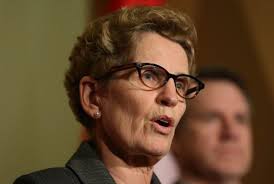The deep thinkers who serve the various political parties in Ottawa have been scratching their heads over the same question: what does the election of Kathleen Wynne’s majority Liberal government in Ontario imply for the federal election, scheduled for October 19, 2015?
The short, easy answer is, “probably not much.” The election is 16 months away. One week can be an eternity in politics; to travel 16 months into the political future requires a time machine rather than a calendar. Anything can happen in 16 months, and almost certainly will.
Who would have predicted 16 months before the June 1968 election that Lester Pearson would resign as Liberal leader and prime minister, that he would be succeeded by a new recruit, Pierre Trudeau, and that a strange phenomenon, dubbed Trudeaumania, would propel the Liberals to a majority government?
Who would have predicted 16 months before the stunning October 1993 election that Canada would gain its first female PM and lose her almost immediately as the majority Progressive Conservative government disintegrated, retaining only two seats in the whole country as a separatist party became the official opposition, just a pair of seats ahead of a new protest party, Reform, which replaced the Tories as the voice of the west?
Who would have predicted 16 months before the May 2011 election that an “orange wave” would sweep Jack Layton’s NDP into the position of official opposition, reduce the Liberals to third place and, in the process, hand Stephen Harper and his Conservatives a majority government? And, finally, who would have predicted 16 months ago, when Justin Trudeau was elected leader of the Liberals, that he would lead them to the top of the opinion polls and keep them there for 14 unbroken months, right up to the present?
If history teaches us nothing else about politics, it is that the only safe response when contemplating events many months in the future is: “I don’t know.” But political thinkers and practitioners, like pollsters and pundits, hate those three little words. Have you ever heard Stephen Harper admit, “I don’t know?” I thought not. Doubt has no place when it comes to political forecasting.
That said, we all look for threads or clues to reveal the future. Some analysts probing the Ontario election results have noted the tendency of voters in the province to play a balancing game. When the Liberals are in power in Ottawa, they like to balance the scale with Conservatives at Queen’s Park. And vice versa. This balance-of-power theory suggests Wynne’s victory bodes well for Harper’s Tories, especially in the Greater Toronto Area, while it bodes ill for Trudeau’s Liberals.
Other analysts see in the Ontario vote a rejection of Hudak’s right-wing agenda and an embrace of Wynne’s centre-left approach. If that sentiment carries over to the federal election, it would to play to Trudeau’s advantage and to Harper’s disadvantage in the province where national elections tend to be won and lost.
Having already admitted I don’t know, permit me to offer a couple of observations. First, there is growing arrogance in Harper’s Ottawa — a my-way-or-the-highway attitude — that I don’t think sits well with the sort of Ontarians who voted for Kathleen Wynne.
Second, Wynne didn’t win just because she positioned her Liberals as the only choice on the progressive side of the ledger. I think she won because she projected an air of authenticity that neither of her opponents could rival. Hudak seemed driven by narrow political expediency, while Andrea Horwath, the NDP leader, tried to transition from social democracy to conservative populism. Neither worked.
By comparison, Wynne came across as the real goods. When she talked about equity, she did so with conviction and passion. She was believable. Voters are pretty good when it come to spotting the unbelievable. At least, they are in Ontario.
Will this have any bearing on the 2015 federal election? Perhaps not. Sixteen months is more than an eternity in political time.
Cambridge resident Geoffrey Stevens, an author and former Ottawa columnist and managing editor of the Globe and Mail, teaches political science at Wilfrid Laurier University and the University of Guelph. His column appears every Monday in Waterloo Region Record and Guelph Mercury. He welcomes comments at [email protected]



